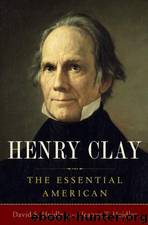Henry Clay: The Essential American by David S. Heidler; Jeanne T. Heidler

Author:David S. Heidler; Jeanne T. Heidler
Language: eng
Format: mobi
Tags: Legislators - United States, Legislative Branch, Legislators, Political Science, Government, Henry, Political, General, United States, 19th Century, Historical, Clay, Biography & Autobiography, United States - Politics and government - 1815-1861, Biography, History
ISBN: 9781400067268
Publisher: Random House Publishing Group
Published: 2010-05-04T04:52:19.074699+00:00
CHAPTER ELEVEN
Three Campaigns
THERE IS AN old saying that troubles come in threes. In the years following Clay’s disappointment at the Harrisburg convention, he would be a living illustration of it. During that time, he waged three campaigns, all interconnected but each having different objectives. One was the immediate effort to get Harrison elected. Concurrent with that effort was Clay’s own bid to follow Harrison in the presidency in 1844. He planned to begin staking his claim for Whig loyalty with selfless and energetic exertions for the party and Old Tip. He counted on Harrison’s pledge that he would serve only one term and looked beyond the old man to other possible rivals.1
The third campaign was economic, and involved reviving the national bank to stabilize the currency, sustaining a protective tariff to promote industry, and distributing land revenues to the states that in turn would be used to fund internal improvements. Clay was reasonably confident that the realization of the Whig program would be relatively easy. He was certain that he could persuade Whig majorities in Congress to pass it, and that he could rely on Harrison’s assurance of executive passivity to sign it into law.
The third campaign, though, proved the adage about troubles coming in threes. A development that shocked the country was the cause, although Clay himself had both dreaded and expected its occurrence. No foresight or preemptive action could have prevented what happened—the devastation of the Whig program and the near destruction of the party—and nothing but Clay’s abject surrender to circumstance would have prevented many from settling on him almost all the blame for what happened. Yet the die setting up the debacle had been cast by other hands in another place long before. It had been cast at Harrisburg by men who had wanted to win the election at all costs. When it all went wrong, it was easier to blame Clay.
Download
This site does not store any files on its server. We only index and link to content provided by other sites. Please contact the content providers to delete copyright contents if any and email us, we'll remove relevant links or contents immediately.
The Secret History by Donna Tartt(18169)
The Social Justice Warrior Handbook by Lisa De Pasquale(11956)
Thirteen Reasons Why by Jay Asher(8458)
This Is How You Lose Her by Junot Diaz(6443)
Weapons of Math Destruction by Cathy O'Neil(5837)
Zero to One by Peter Thiel(5495)
Beartown by Fredrik Backman(5366)
The Myth of the Strong Leader by Archie Brown(5241)
The Fire Next Time by James Baldwin(5022)
How Democracies Die by Steven Levitsky & Daniel Ziblatt(4965)
Promise Me, Dad by Joe Biden(4909)
Stone's Rules by Roger Stone(4865)
100 Deadly Skills by Clint Emerson(4694)
A Higher Loyalty: Truth, Lies, and Leadership by James Comey(4554)
Rise and Kill First by Ronen Bergman(4547)
Secrecy World by Jake Bernstein(4390)
The David Icke Guide to the Global Conspiracy (and how to end it) by David Icke(4384)
The Farm by Tom Rob Smith(4328)
The Doomsday Machine by Daniel Ellsberg(4248)
